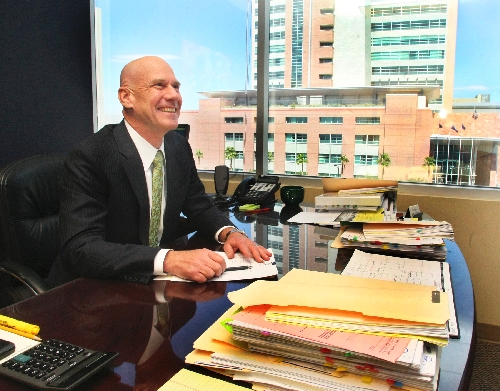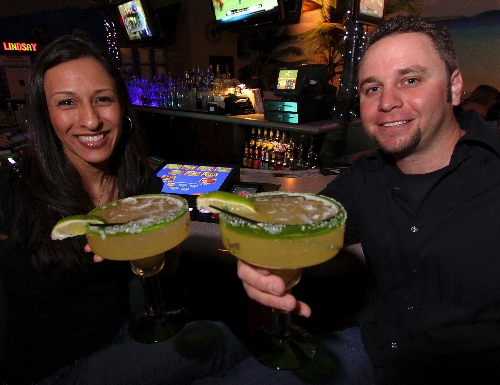Five obscure entrepreneurs in Southern Nevada who make it work
Steve Wynn, who is credited with revolutionizing the Strip casino resort business, has become the personification of Las Vegas. Yet hundreds of thousands of successful, but obscure, business owners and professionals are also redefining Southern Nevada's economy.
Here are a few of their stories.
HARRY MARQUIS
Harry Marquis, the son of an artist and schoolteacher in St. Louis, was working on a graduate degree in biology at the University of Nevada, Las Vegas when he began to wonder about pursuing another career.
His uncle, then District Judge John Mendoza, suggested law school and Marquis' future was set.
He enrolled at the University of San Diego, a private Catholic school. Now 56, he works as a civil attorney in Las Vegas. He has 27 years experience.
A major event in his career involved helping his law firm represent defendant corporations in lawsuits stemming from the 1980 fire at the first MGM Grand hotel in Nevada and the 1983 fire at the Las Vegas Hilton.
The MGM fire caused the deaths of 87 people. The Hilton fire is blamed for eight deaths.
Marquis became a business-case litigator, but he also handles divorces, automobile accidents, injury cases and multimillion-dollar real estate contracts.
He works out of the law offices of Santoro Driggs. He's not a member of the firm; he rents office space.
Marquis sets himself apart from many of his peers by not advertising his services.
"You are not going to see my face on a billboard," he said.
Instead, Marquis relies on word-of-mouth for referrals.
One client is Banner Promotions, which is run by President Arthur Pelullo, but Marquis claims no special relationship with boxing celebrities.
A painting on the wall shows Acelino "Popo" Freitas, a World Boxing Organization lightweight champion, losing to Juan "Baby Bull" Diaz in 2007 at the Foxwoods Resort Casino in Connecticut.
Like a prizefighter, Marquis changes tactics when the game changes. After the real estate bust, he stopped relying on real estate developers, real estate brokers and homebuilders for the bulk of his billings. He switched his focus to divorce cases.
"When things are down in one arena, hopefully things are up in another," he said. "A lot more people are getting divorced because they're broke and they're mad," Marquis said. "A lot of times they want to fight a nuclear battle and they can only fight a gun battle on Main Street."
Marquis has no plans to join a big firm or to start one.
"It's a small business. I want to keep it small," Marquis said. "I like going to court and arguing a case. That can be a lot of fun, especially if you win. I like dealing with the people, and I like dealing with other lawyers."
His wife, Linda Norvell Marquis, understands. She is a criminal defense attorney and associate of William B. Terry Chartered. The couple has three children.
RANDY HENDERSON
Randy Henderson grew up in the small city of Pryor, Okla. So he has an intimate understanding of small-town America, where a used car as more than a mode of transportation.
Henderson, 35, said his company, Alternative Motors, has a good opportunity to prosper by selling and financing used cars for rural and small-town residents.
"The business that we're doing really fills a need and void," Henderson said. "It really does help these people obtain basic transportation."
Small-town residents, he said, don't have the option of calling a cab or taking a city bus.
Other used-car sales companies typically rely on third parties to provide financing for used-car buyers, but many buyers have bad credit or lack bank accounts.
The need for used-car financing grew when small-town banks, which traditionally offered car financing, pulled back from the market because of the financial crunch.
Henderson cut his business skills in the wireless telecommunications industry, not used-car sales.
He worked as one of five directors for Lucent Technology in Australia, where he acquired sites and obtained zoning for cell-phone towers. Henderson returned to Oklahoma and went to work for former Rep. J.C. Watts, R-Okla., who also ran a wireless-communications company.
Next, he did a stint at SBA Communications as a vice president of operations. He left that position to form Alternative Motors in late 2008.
Henderson intends to take Alternative Motors public so that investors can buy and sell shares on the Over-the-Counter Bulletin Board.
He plans to have 12 locations in operation by year-end in Oklahoma, Missouri, Georgia, Florida, Illinois and Kansas.
TONY DELGADO
Tony Delgado grew up in a family of restaurant owners in El Paso, Texas. He studied graphic and fine arts, but he fancied dancing most.
"In my Latin culture, it was admired when a man can dance," he said. "Unfortunately, in this country, it is not considered as important as academics because it's an art form."
Delgado, 43, started competing as a professional dancer at age 21. It was tough to excel -- much of his competition had danced since early childhood.
"For the first two years, I was happy if I was second to last (in competition)," Delgado said. "I just thought I was good. I had showmanship but not the technique."
Success came later. He met his wife, Dana, in the San Francisco Bay Area and they competed as a couple. He continued to work as an instructor, too.
The couple in 1997 became a U.S. National Finalist in Ballroom Dancing's Latin American division.
They married the following year. "Now, I'm making other people champions," Tony Delgado said.
He was selected the No. 1 Pro-Am dance instructor in the world by the Dancesport Series in 2005 and 2006.
"It was the first time someone had done that two years consecutively," he said.
He opened Delgado Dance Studio in 2006 as the local economic boom was about to go bust.
"It got very, very scary for a while," he said. "I kept telling myself: 'Weather the storm.' "
The business survived. The company also established a ballroom dancing program for public school students ranging from third grade through high school.
Delgado Dance Studio became a place for celebrities to polish their dancing skills.
Rachel Uchitel, allegedly one of Tiger Woods' mistresses, has been taking ballroom dancing lessons, Las Vegas Review-Journal columnist Norm Clarke reports.
Delgado trained three Las Vegans for the television program "Dancing With the Stars" -- Penn Jillette, Floyd Mayweather Jr. and Holly Madison.
"I would say this year has been my best so far," Delgado said.
He attributes his success partly to the friendly atmosphere and the opportunity he provides for people to dance their cares away.
"People need joy in their lives," he said. "Maybe they're not spending as much, but they are hanging around more (in Delgado Dance Studio)."
RONDA MATTHEWS-WOLFE
Ronda Matthews-Wolfe learned to enjoy the limelight when she was married to Jack Matthews, once owner of the state's biggest independent realty sales company.
An Air Force brat, she moved to Las Vegas in 1971 when her father was assigned to Nellis Air Force Base.
She was working as a waitress when she met Jack. He hired her as a secretary, promoted her to sales and married her.
Matthews operated the largest independent real estate company in Nevada for more than 30 years, she said. At one point, he had more than 500 real estate salespeople working for him in Las Vegas and Reno.
Her husband died in 2002, and Ronda Matthews reopened Jack Matthews & Co.
She later married James Wolfe. When Wolfe was diagnosed with cancer, she devoted her time to his care. Wolfe died in March.
By then, Ronda Matthews-Wolfe had closed the real estate firm where she and her second husband worked. The Southern Nevada real estate market, if not still in a nose dive, was still stalled.
She still wanted to sell homes and joined Direct Performance Real Estate Partners. Yet, she has no illusions about the Las Vegas area real estate market.
She and associates George Bedich and Richard Bustos traced the trajectory of Las Vegas housing market in the last few years. The typical local house sold for $120,000 in 2000, jumped to $250,000 in 2007 and returned to where it started 10 years ago.
"You're making less money, and you're making more sales and you're working harder," she said.
Most of the homes on the market are foreclosures or short sales in which the bank agrees to let the owner sell for less than the amount owed on the mortgage.
Even with the real estate market in a funk, she is happy to be back at work.
"I love what I do. I don't want to actually ever retire," she said. "Jack taught me: If you enjoy what you do, you'll never work a day in your life."
JASON GODFREY
still want to grow up to be firefighters or police officers. Jason Godfrey, though, always wanted to be an entrepreneur, following in the footsteps of his father, a convenience store owner.
The Las Vegas native earned dual bachelors degrees in managerial finance and accounting at the University of Nevada, Las Vegas.
He started as a valet at The Orleans at age 19, became a valet supervisor by 22 and advanced to valet manager at 25.
Godfrey completed half of the work on a master's of business administration degree and then he dropped out to pursue a business opportunity.
He used money he saved, home-equity loans and investments from friends and family to buy Doc Holliday's, an unprofitable 4,000-square-foot restaurant and bar, in late 2006. He was 28 and managing partner of a small business.
He changed the bar's name to Sagos Baja Tavern Lounge -- it's named after a palm tree.
Godfrey and his wife, Lorena, spent most of their time at the bar so they would know when changes and improvements were needed. If a good customer liked a specific brand of beer, for example, Godfrey stocked it.
The Godfreys put an inflatable bed in a back room so they could rest without leaving the bar.
"For the most part, it seemed like it was get up, go home, shower and go back to work," Godfrey said. "It was really scary for a little bit because all the bars around here were folding.
"Ten days after we took over, the smoking ban came into effect," Godfrey said.
He closed the kitchen because of the new law, but eventually he won approval to sell takeout food and block off an area from smoking.
Like Cheers, the bar in the former television sitcom, Sagos is a local bar that everybody cares about, Godfrey said. "They come in here to get away from it all and to leave their worries behind."
Sales are "starting to pick up again, " he said. "We definitely work hard to make sure our customers are having a good time."
Godfrey, meanwhile, is planning to open more bars.
Contact reporter John G. Edwards at jedwards@reviewjournal.com or 702-383-0420.



















